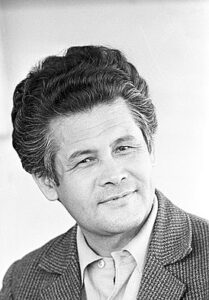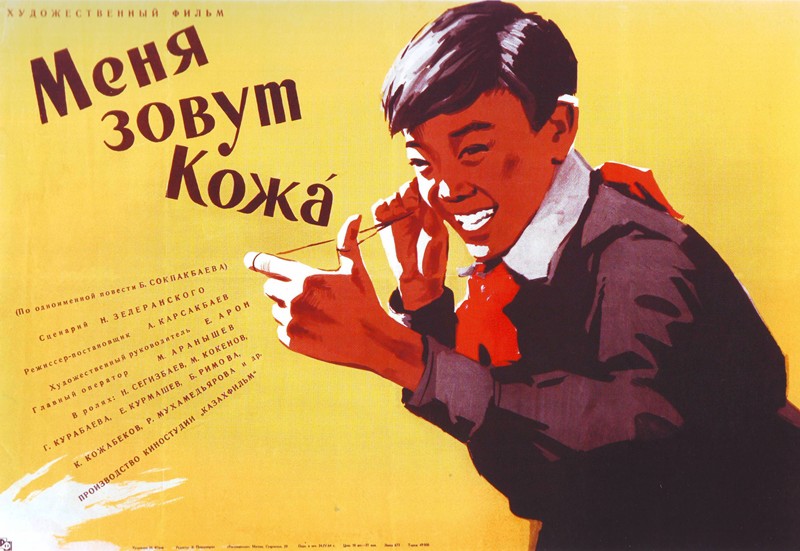ASTANA – Kazakhstan marks 100 years since the birth of a prolific Kazakh writer for children, Berdibek Sokpakbaev, whose humorous and kind stories engaged children and adults alike. He was best known for the highly regarded and popular “My Name is Kozha” novel, which was adapted for film in 1963.

Berdibek Sokpakbaev. Photo credit: adebiportal.kz
Sokpakbaev is considered a classic of Kazakh children’s literature, but his books are loved by readers of all ages and generations. His 100th anniversary was included in the United Nations Educational, Scientific and Cultural Organization (UNESCO) commemorations.
Early life and works
Born in 1924 in the mountainous Kostobe village of the Almaty Region, Sokpakbaev had a hard childhood. He was born into a family living in poor circumstances. His mother died when he was an eight-year-old boy, and later in life, his older brother Satylgan died during World War II.
After the army, Sokpakbaev studied at the Kazakh Pedagogical Institute in Almaty, and later graduated from the Higher Literature Courses in Moscow.
Sokpakbaev began his writing career with a collection of poems, which was published in 1950. Although he began by writing poems, he became more drawn to stories that explore the complexities of child-adult relationships, often through the lens of his own experiences.
In writing his first story, “A Sixteen-Year Champion,” in 1951, Sokpakbaev drew on the countryside life of ordinary Kazakh people. Confident in his knowledge of children and the details of their lives, he frequently grounded his stories in everyday situations.
Two more novels, “The Road of Happiness” (1953) and “A Tale of Myself” (1957), followed before his career really took off with “My Name is Kozha,” a story about a troubled teenager with a great, sincere character.
Kozha – the character loved by all
An irrepressible dreamer and mischievous Kozha often finds himself in the most troubled situations but manages to get out with honor thanks to his sincere character, intelligence and wit. Endowed with a sense of higher justice, he is always direct in his actions, responsive to other people’s grief, and loyal to friends, even those who prove destructive.

“My Name is Kozha” movie poster. Photo credit: kinopoisk.ru
Many of Kozha’s adventures were well-intentioned, taking on social injustice and against the adults who perpetrate it. With a lot of action, the story of Kozha is tightly plotted, and other teenage characters have enough emotional complexity to be captivating to readers.
All these qualities stirred a deep, kind response in the hearts of readers, evoking trust and sympathy for the young hero—a boy from a distant Kazakh village. Kozha became a nationally loved character.
“My Name is Kozha” made Sokpakbaev’s reputation as a significant writer for children and teenagers.
In one of the most difficult moments of his life, Sokpakbaev said: “Frankly speaking, thanks to this story I managed to survive; thanks to it my spirit was not broken. It supported me in the darkest days both in material and moral sense.”
The book was later translated into Russian, which served as the basis for its translation into numerous other languages, including English, Polish, Czech, and Bulgarian.
In the United States, the book was published in 2016, translated by Catherine Fitzpatrick as part of the We Are Kazakhs: Classic Books of Kazakh Writers in English collection, released by Metropolitan Classics under the supervision of Bigeldy Gabdullin, President of the Kazakh Pen Club.
In 1963, the story of Kozha was made into a feature film directed by Abdullah Karsakbayev.
Sokpakbaev – a children’s writer at heart
The originality of Sokpakbaev’s writing was often based on his own life spent navigating the complexities of his childhood. His hard childhood served as an invaluable preparation and source of inspiration for his stories, particularly in “Journey to Childhood,” published in 1960.
Set in the 1930s, the story vividly portrays the harsh realities of the time and the struggles of the Kazakh people through the fate of its young character. With warmth and wit, Sokpakbaev recounts his childhood, offering readers an authentic glimpse into the historical truth of the era.
His gift for storytelling further captivated readers once again in “The Dead Do Not Return,” a novel written in 1967. It follows the life and growth of a determined, principled young man who overcomes life’s many challenges. Sokpakbaev’s stories were full of playful narratives with unexpected and humorous twists.
In later years, it was said that he stopped writing stories because Soviet censorship prevented him from telling the truth, yet he remained a writer at heart, preserving his vivid creative vision until his final days.
Children’s writer Sokpakbaev passed away in 1991 due to a heart attack.
